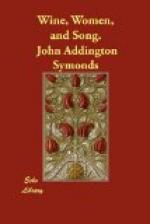The time has now come for me to introduce my reader to the versions I have made from the songs of Wandering Students. I must remind him that, while the majority of these translations aim at literal exactness and close imitation of the originals in rhyme and structure, others are more paraphrastic. It has always been my creed that a good translation should resemble a plaster-cast; the English being plaque upon the original, so as to reproduce its exact form, although it cannot convey the effects of bronze or marble, which belong to the material of the work of art. But this method has not always seemed to me the most desirable for rendering poems, an eminent quality of which is facility and spontaneity. In order to obtain that quality in our language, the form has occasionally to be sacrificed.
What Coleridge has reported to have said of Southey may be applied to a translator. He too “is in some sort like an elegant setter of jewels; the stones are not his own: he gives them all the advantage of his art, but not their native brilliancy.” I feel even more than this when I attempt translation, and reflect that, unlike the jeweller, it is my doom to reduce the lustre of the gems I handle, even if I do not substitute paste and pebbles. Yet I am frequently enticed to repeat experiments, which afterwards I regard in the light of failures. What allures me first is the pleasure of passing into that intimate familiarity with art which only a copyist or a translator enjoys. I am next impelled by the desire to fix the attention of readers on things which I admire, and which are possibly beyond their scope of view. Lastly comes that ignis fatuus of the hope, for ever renewed, if also for ever disappointed, that some addition may be made in this way to the wealth of English poetry. A few exquisite pieces in Latin literature, the Catullian Ille mi par, for example, a few in our own, such as Jonson’s Drink to me only with thine eyes, are translations. Possibly the miracle of such poetic transmutation may be repeated for me; possibly an English song may come to birth by my means also. With this hope in view, the translator is strongly tempted to engraft upon his versions elegances in the spirit of his native language, or to use the motives of the original for improvisations in his own manner. I must plead guilty to having here and there yielded to this temptation, as may appear upon comparison of my English with the Latin. All translation is a compromise; and while being conscious of having to sacrifice much, the translator finds himself often seeking to add something as a makeweight.
I shall divide my specimens into nine Sections. The first will include those which deal with the Order of Wandering Students in general, winding up with the Confession ascribed to Golias, the father of the family. The second, third, fourth, and fifth are closely connected, since they contain spring-songs, pastorals, descriptive poems touching upon love, and erotic lyrics. The sixth Section will be devoted to a few songs of exile, doubt, and sorrow. In the seventh we shall reach anacreontics on the theme of wine, passing in the eighth to parodies and comic pieces. Four or five serious compositions will close the list in the ninth Section.




